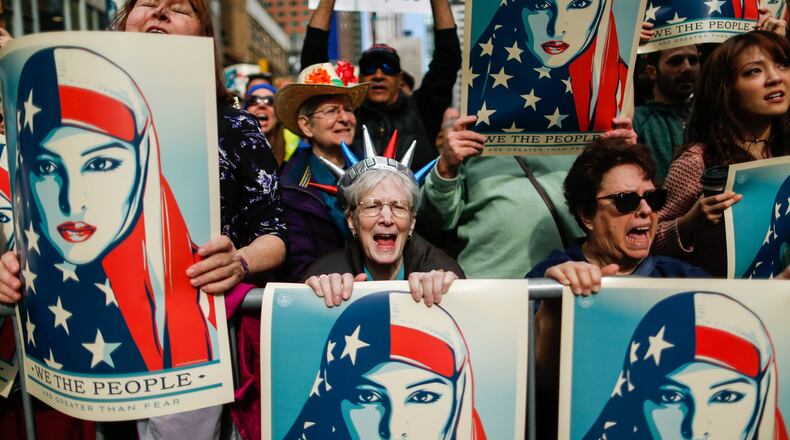Hours before the Trump administration’s revised travel ban was set to take effect, a federal judge in Hawaii froze the order.
The executive order - set to start at 12:01 a.m. - would have halted the flow of visitors from six Muslim-majority countries and refugees from around the world.
It marks the second time that President Donald Trump's efforts to restrict travel into the United States from specific countries has been blocked by a federal judge.
U.S. District Judge Derrick K. Watson late Wednesday froze the order nationwide. Hawaii was one of three states hearing last-minute challenges to the revised law. The other two are Maryland and Washington.
Lawyers for Hawaii argued the new travel ban, much like the old one, is essentially a Muslim ban. They said it damages the ability of state businesses and universities to recruit top talent and harms tourism.
Appearing at a rally in Nashville on Wednesday, Trump reacted furiously to the decision in Hawaii and vowed to fight on, saying the nation’s security is at stake. He said his latest directive is a “watered-down version of the first one.”
“Let me tell you something, I think we ought to go back to the first one and go all the way, which is what I wanted to do in the first place,” he said, his voice growing hoarse. “The danger is clear. The law is clear. The need for my executive order is clear.”
The executive order comes with potential impacts for the Atlanta region, a tourism destination with the world's busiest airport, a substantial foreign-born population and businesses and institutions with international connections. Many immigrants and refugees are drawn to the area because of its jobs, affordable housing and access to mass transit.
Opponents of the executive order had been organizing a demonstration for Thursday afternoon at Hartsfield-Jackson Atlanta International Airport, and a network of local pro bono attorneys is gearing up to respond to any fallout from the directive.
There were large demonstrations at the Atlanta airport after the first ban took effect, sowing confusion and chaos for travelers from affected countries.
Several state attorneys general and civil rights groups sued to block the directive, arguing it is unconstitutional. The White House says the executive order is a legal directive aimed at preventing terrorist attacks on U.S. soil.
“Like every nation, the United States has a right to control who enters our country and to keep out those who would do us harm,” Attorney General Jeff Sessions said last week after Trump signed the revised order. “This executive order seeks to protect the American people as well as lawful immigrants by putting in place an enhanced screening and vetting process for visitors from six countries.”
Last month, a federal appeals court based in San Francisco upheld a temporary restraining order against Trump's first travel ban. In that case, the states of Washington and Minnesota argued the directive was hurting their economies and universities and that it violated the First Amendment's ban on government establishment of religion. The states pointed out that Trump campaigned on "a total and complete shutdown of Muslims entering the United States." Parts of his executive order, according to the states, were "intended to disfavor Islam and favor Christianity."
The new order would bar visitors from some six predominantly Muslim countries for 90 days: Iran, Libya, Somalia, Sudan, Syria and Yemen. Iraq — a major ally in the fight against the Islamic State — has been dropped from the original list of seven nations. Travelers with valid visas are exempted. So are green card holders, some of whom were detained in January at Atlanta's airport after returning from trips to Iran.
Also, the nation's refugee resettlement program will be halted for 120 days. But Syrian refugees will not be barred indefinitely as the original order required. And just as the original directive ordered, the total number of refugees who may be resettled in the U.S. in the fiscal year ending in September will drop to 50,000, from the 110,000 goal the Obama administration had set.
Several local immigration attorneys manned shifts at the Atlanta airport in January, assisting travelers who were detained amid Trump’s first travel ban. They had been ready to return if necessary.
“We are monitoring the situation,” said Sarah Owings, chairman of the Georgia-Alabama chapter of the American Immigration Lawyers Association. “We are hoping at least that things will be a little more orderly as far as how people are affected.”
An Atlanta airport spokesman said officials are aware of the possibility of a protest Thursday and are monitoring discussions about it on social media. A New York-based group calling itself “Refusefascism.org” – which is seeking Trump’s ouster — is calling for a protest at Atlanta’s airport Thursday afternoon. The group did not have an immediate estimate for turnout.
“We are organizing protests across the country because this is a Muslim ban 2.0,” said Sunsara Taylor, a co-initiator of Refusefascism.org. “This still has the intent and the effect of banning people from predominantly Muslim countries.”
Trump has denied his order is a “Muslim ban” and he tweeted after the appeals court ruling: “See you in court, the security of our nation is at stake!”
Staff writer Kelly Yamanouchi contributed to this report.
About the Author





